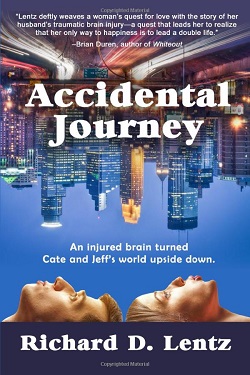March is Brain Injury Awareness Month; Local Author Dr. Richard Lentz Explores TBI in His Book, Accidental Journey
 Friday, March 1, 2024 at 2:23AM |
Friday, March 1, 2024 at 2:23AM |  Becky Fillinger |
Becky Fillinger | Article by Becky Fillinger, photos provided
Our downtown neighbor, Dr. Richard D. Lentz is a clinical and forensic psychiatrist at Park Nicollet Health Services and a retired Adjunct Professor of Psychiatry at the University of Minnesota. He has extensive experience with individuals and families who have coped with traumatic brain injury (TBI). He is also an author. His first novel, Accidental Journey, explores traumatic brain injury. We talked to him about the inspiration for the novel, narrative medicine and his future writing plans. March is Brain Injury Awareness Month – so it's an ideal time to pick up the novel, support a local author and learn about this common injury. You can also see Dr. Lentz discuss his book on March 11 at Magers & Quinn Booksellers – register here for the event.
 Q: Thank you for speaking with us. Is this your first novel? What inspired you to write a novel about traumatic brain injury?
Q: Thank you for speaking with us. Is this your first novel? What inspired you to write a novel about traumatic brain injury?
A: Yes, this is my first novel. As a clinical and forensic psychiatrist, I treated patients and families with traumatic brain injury, testified in brain injury cases as a forensic psychiatrist - and realized that the public knows very little about TBI. Even physicians sometimes missed it! In retirement, I chose fiction as the best vehicle to make accessible this common, real, and poorly understood affliction - a story I was passionate to tell for its social value.
Q: Were the characters in Accidental Journey based on real people, or did you create them from scratch?
A: All the characters - Jeff, Cate, and the kids - are fictional. No patient I have encountered would think this as their story. However, I did use my experience and knowledge to create characters who reflect real problems that TBI patients and their families face, in the acute phase and during prolonged treatment and recovery.
Q: Can you tell us about narrative medicine and why you believe it is helpful in cases of TBI?
A: Narrative medicine is a broad concept that means using story to help clinicians and the public understand the healthcare experiences of patients and families. It begins with understanding every patient as a unique person, knowing their stories, what their lives are like, taking detailed histories that goes far beyond the problems for which they seek care. A novel that tells stories like Cate and Jeff's, immersing one in the injury and pulling the reader through their experience, falls within that broad definition.
 Dr. Richard D. LentzQ: How did you balance the medical aspects with the emotional and personal experiences of the characters?
Dr. Richard D. LentzQ: How did you balance the medical aspects with the emotional and personal experiences of the characters?
A: Brain injury affects one's ability to remember, to process information, to relate to others. It affects one's personhood, so a person with TBI cannot separate the medical aspects from their emotional and personal experiences. That said, there are medical events that take place over time as the consequences of the injury unfold, with emotional impact for individuals and families. An interesting story must be emotionally real, not just inform. In writing Accidental Journey, I had two audiences in mind, those who want to know more about TBI, and those who enjoy literary fiction.
Q: Were there moments that were particularly difficult to capture in your narrative? Did you face any unique challenges in conveying medical information in a fictional narrative?
A: Jeff, following his particular kind of TBI, lacks insight into how his injury has affected him. Because of this, he cannot tell us what he feels or thinks. Jeff has to reconstruct his experience from fragments of memory and emotion. The story relies on the interactions of Jeff's wife and children with Jeff, what they observe and feel, to tell the story of Jeff's injury.
Q: What message or awareness do you hope readers gain from Accidental Journey?
A: My hope is that readers acquire knowledge and experience empathy - a greater understanding of how TBI affects individuals and families and compassion for what they endure.
Q: Let’s talk about your future writing plans. Do you plan to explore similar themes or medical topics in your future works?
A: Sports injuries and war injuries are often in the news. Accidental Journey is about an accident, since accidents - falls, motor vehicle crashes (also assaults and abuse) - cause the great majority of TBIs. I have in mind the story of a soldier and the story of an athlete.
Q: Wonderful! Might we see you leading or participating in book club discussions of Accidental Journey?
A: I have presented my work, with readings, to book groups. It's fun for me, and responses have been positive.
Q: How may we follow your news?
A: I have a website, RichardDLentz.com. I hope to keep my book in the news, especially around March, which is Brain Injury Awareness Month, and around the Holidays. At any time of the year, books make wonderful gifts!
- - - - - - - - - -
Copies of Accidental Journey are available for purchase through Amazon, Barnes and Noble Online, and can be ordered at book stores. The book is also available to libraries and bookstores through Ingram, and is in both paperback and Kindle formats.
